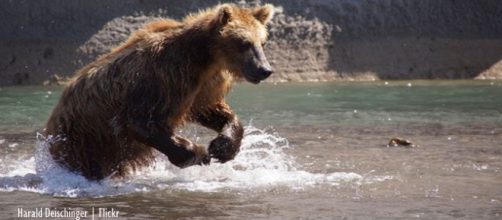Siberian bear attacks are on the rise. Back in 2014, the Guardian reported that "three people in Siberia" and far-east Russia were attacked in a matter of weeks. The carnage continues, with more reports coming from Russia this week. In an incident in October this year, a group of hunters returned to their car and found it apparently trashed by a bear. Actually, the hunters were after a wild boar, but that didn't stop the bear from ripping their car apart. The vehicle was damaged beyond repair.
Siberia: Bear incidents in recent times
The attacks by bears in the cold regions of Russia include one on a 14-year-old on Iturup island.
According to the Guardian, the bear encountered the boy walking home from the house of his grandmother. It attacked him before dragging him away. The bear died after being shot, while the boy got nearly 200 stitches. Around the same time, three workers were killed by a bear on Sakhalin island. In the Sakha Republic, one man was attacked, and with his head being bitten, ended up saved by his cell phone when the ringtone activated.
In August this year, Vadim Klabukov, a trainee ranger died after going to "retrieve a lost backpack in South Kamchatka Nature Reserve." according to the Siberian Times. Two "cannibal" bears that earlier killed and stashed another bear in their larder "gnawed" the young ranger to death.
The incident was described as unusual as the bears were not hungry and had another bear and some salmon to feed on. Apparently, this strange behavior may be influenced by climate change.
A brown bear filmed hopping about Krasnoyarsk, the third largest city in Siberia pic.twitter.com/0Fjz4sRD3H
— The Siberian Times (@siberian_times) September 24, 2018
Bear behavior related to climate change
Experts theorize that bear attacks are more common lately, due to climate change and the influence of humans on the environment. The planet is experiencing dramatic climate events, like torrential rain through to devastating drought. Russia experienced a drought and an associated heatwave that was so severe in 2014, that the "ceremonial changing of the presidential guard had to be canceled." Elsewhere giant hail stones caused damage.
In 2018, the dry conditions are so bad that the permafrost is melting.
Space.com believe this is a dangerous situation as the melt releases bacteria that produce carbon dioxide and methane - both powerful greenhouse gases. Change of climate stresses nature, and the bears also feel the effects. This brings them into conflict with humans. WWF Russia notes that the biorhythms of bears can become affected by the weather. Basically, if a bear should be hibernating, and isn't, then the food they need is scarce.
A brown bear finds and rips hunters' car. Three men from Krasnoyarsk got a lot more than they bargained for in Siberia taiga https://t.co/GQ0HIa1SqS pic.twitter.com/KEEwEmpULC
— The Siberian Times (@siberian_times) October 25, 2018
Human impact on salmon
Bears love to eat salmon, but the fish population declined through human activity.
The news agency, Interfax, reported that nets and obstacles placed along rivers prevent the salmon traveling upstream. Bears can wait in vain for months for their favorite food to arrive. Hungry, they become aggressive and will turn to other food sources - even human ones. Increasing conflict with humans usually ends badly for the bears. The Siberian Times notes that once a bear tastes human blood, they become accustomed to killing and eating them. Usually, bear attacks result in the bears being destroyed.
The long-term answer for the aggressive bears in Russia is that the world has to take determined steps to try and curb global warming and climate change. They are no longer theories about something that will happen to other people in the future. The victims of the giant Russian bears of Siberia know only too well that when you mess with nature, bad things happen.

